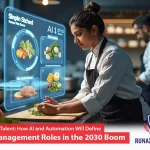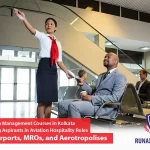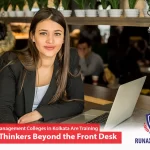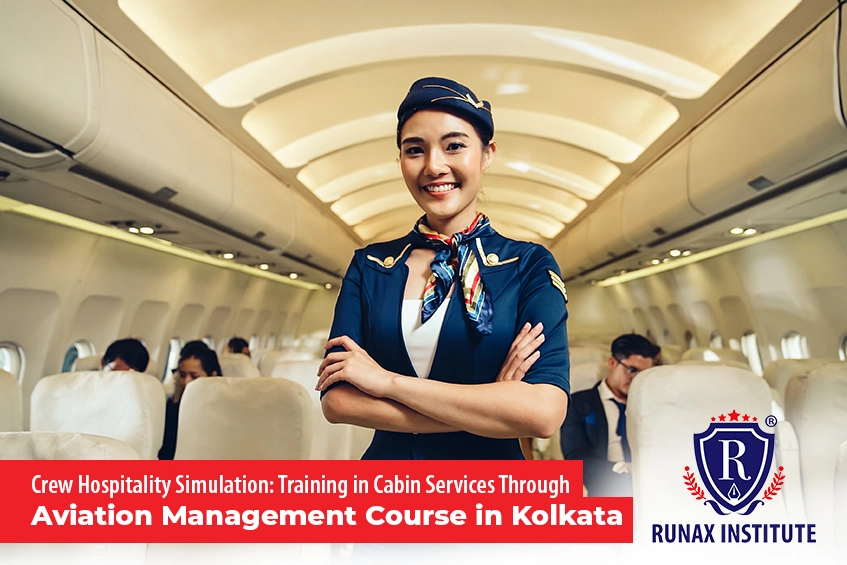Introduction
Every passenger expects more than just a smooth flight—they expect impeccable service, seamless interactions, and a cabin crew that anticipates their needs at 35,000 feet. But how do aviation professionals learn these hospitality secrets? The answer lies in the emerging Aviation Management Course in Kolkata, where future cabin crew are trained using advanced hospitality-focused simulations.
In today’s aviation industry, airlines don’t just hire attendants—they hire brand ambassadors. That’s why top aviation management institutes in Kolkata are integrating cabin crew hospitality training with real-world mockups, VR cabin simulation, and AR flight service labs. Trainees learn how to manage meals, resolve passenger issues, and handle service emergencies while balancing strict safety protocols. They perfect their aviation soft skills modules in settings that mirror real-world cabins.
Failing to train future crew with these hands-on tools risks leaving graduates unprepared for the competitive airline industry. But through this advanced, immersive curriculum, students walk out ready to handle turbulence, not just in the air, but also in service.
Immersive Cabin Environments: Building Real-World Context
A realistic mock aircraft cabin isn’t a luxury anymore—it’s a necessity in training. In Kolkata aviation hospitality labs, institutes recreate the interiors of airliners, complete with narrow aisles, food trolleys, cramped galleys, and authentic seating layouts. Here, students aren’t daydreaming about first class—they’re actively rehearsing their roles.
Students engage in passenger interaction roleplay, delivering scripted services while navigating the narrow spaces. Need to serve meals mid-flight? They rehearse trolley handling. Attending to a nervous flyer? Trainers teach empathetic responses and smooth guest care techniques. From handling multilingual cabin service tasks to dealing with VIPs, students simulate real-world pressures.
VR cabin simulation layers the experience. Using headsets, trainees simulate turbulence scenarios, assess service flow during high-pressure periods, and practise calm communication when flights hit rough air. These exercises ensure that future cabin crew develop operational dexterity and emotional intelligence.
Each day in these labs merges realism with technical mastery, shaping professionals who won’t buckle under in-flight service strain.
Emergency & Service Dual Training: Balancing Crisis with Courtesy
Nothing puts cabin crew talent to the test more than in-flight situations. Yet, smiling while managing a crisis? That’s advanced hospitality. Courses blend emergency hospitality drills with courteous service techniques, ensuring students are crisis-ready without compromising guest experience.
Trainees act out evacuation situations, turbulence incidents, and medical diversions. Picture a mock cardiac arrest mid-flight—while CPR protocols begin, another trainee maintains calm cabin announcements. This blend of in-flight empathy training and operational SOP creates poised professionals who handle crises without losing the human touch.
This approach builds confidence. Future crew can address safety incidents while comforting worried passengers. They learn that professionalism isn’t just following protocols—it’s combining care with control. Airlines today need this rare mix of technical compliance and compassionate service.
Soft-Skill Development: Cultural Sensitivity & Communication
At 35,000 feet, your passenger could be from Tokyo, Toronto, or Tangra. That’s why cultural sensitivity isn’t optional—it’s essential. Courses sharpen aviation soft skills modules, focusing on verbal and non-verbal communication styles across cultures.
Roleplays challenge students to manage guests with varying needs: elderly passengers needing assistance, unaccompanied minors requiring extra care, or VIP flyers expecting bespoke services. Instructors train students to deliver multilingual cabin service, adjusting tones and vocabulary accordingly.
Using audiovisual feedback, students refine body language, hand gestures, and personal space awareness. Lessons include stress, resolving conflicts politely, managing dietary requests respectfully, and reading emotional cues from global passengers.
These sessions build emotional intelligence, ensuring graduates don’t just serve—they connect. In Kolkata’s multicultural environment, mastering diverse guest etiquette isn’t a bonus skill—it’s mandatory.
Real-Time Feedback: Tracking Performance with Data Analytics
Performance without feedback is like flying blind. In these aviation courses, feedback isn’t annual—it’s instant. Students operate in digital hospitality platforms where every interaction is tracked.
Data-driven service analytics monitor metrics like tray service timing, meal order accuracy, and even empathy scores during passenger interactions. Dashboards highlight lapses, from delayed service to incomplete safety demos. Trainers coach based on this data, turning each mistake into a learning opportunity.
Just like airlines track cabin crew KPIs, these institutes use performance data to personalise training. Students see their progress on leaderboards, fostering healthy competition. Ultimately, this data-backed coaching boosts both efficiency and guest satisfaction, key metrics airlines watch closely.
Integration with Hospitality Curriculum: Bridging Two Sectors
Here’s where things get innovative. Top hotel management schools in Kolkata aren’t limiting themselves to hospitality—they’re offering aviation management courses with joint modules, creating a powerful, cross-industry curriculum.
Courses cover premium cabin service training, F&B delivery, and guest-care techniques from top hotel service protocols. Students train under chefs for meal presentation, bartenders for beverage service, and concierges for guest etiquette. This hybrid education ensures future crew can deliver restaurant-quality service in mid-air.
This joint aviation hospitality curriculum enhances job prospects, equipping graduates to work both in luxury hotels and premium airline cabins. Airlines love this versatility—it’s service excellence, airborne.
Technology Adoption: VR, AR & Simulation Tools
Airlines are adopting technology, and so should their future crew. Institutes leverage VR cabin simulation, AR flight service labs, and wearable digital tools like HoloLens to train students in tech-first service protocols.
Using digital overlays, trainees receive step-by-step service cues, announcement scripts, and navigational guidance during inflight service drills. This digital integration teaches them how to adapt to onboard tech systems that many airlines now deploy for consistency and quality assurance.
From mastering cabin service tech training to handling digital ordering platforms, students gain hands-on experience in tech-integrated service delivery, preparing them for the airline industry’s digital future.
Workshops & Industry Exposure: Guest Trainer Sessions
It’s not just trainers who guide these students—airline veterans step into the classroom. Senior cabin crew, grooming experts, and HR professionals lead grooming workshops for airlines, conduct passenger interaction roleplay, and share survival stories from real flights.
In mock interviews, students learn what airlines look for. In grooming academies, they master the subtleties of professional presentation. Trainers simulate stressful situations, testing service consistency under pressure.
These sessions align training with actual industry demands, ensuring students understand current airline standards. By learning directly from the pros, students absorb both technical skills and the intangible hospitality nuances airlines demand.
Assessment & Certification: Measuring Hospitality Competence
Talk is cheap. Certificates speak louder. Institutes rigorously assess students through real-time service simulations, evaluating their ability to balance safety, service, and soft skills under pressure.
Trainees receive certifications accredited by IATA and other aviation bodies, signalling proficiency in both regulatory procedures and hospitality finesse. These certifications—whether for cabin crew certification IATA, or premium service endorsements—are vital for employment.
Assessments focus on SOP adherence, emotional composure, crisis handling, and guest satisfaction delivery. Graduates holding these credentials are deemed flight-ready, capable of handling both economy and premium cabins with equal professionalism.
Conclusion: Shaping Holistic Cabin Professionals
Kolkata’s aviation management institutes are redefining cabin crew training by embedding hospitality-first simulations, immersive tech, and data-driven assessments into their courses. This isn’t just about handing out meal trays—it’s about creating in-flight experience managers who embody empathy, precision, and service excellence in aviation.
By merging the aviation management course in Kolkata with hotel hospitality training, these institutes produce cross-functional professionals. Whether it’s premium lounges or economy cabins, these graduates are ready to shine, carrying Kolkata’s aviation education excellence onto the global stage.
Frequently Asked Questions
Q1. What is the role of cabin hospitality simulations in aviation management courses?
Cabin hospitality simulations help students practise service protocols, empathy, and emergency handling using VR and AR tools within mock aircraft environments.
Q2. How do Kolkata aviation institutes teach real-world cabin service skills?
By combining VR cabin simulation, passenger interaction roleplay, and real-time hospitality drills, students master service delivery in realistic cabin environments.
Q3. Are certifications from these aviation courses recognised by airlines?
Yes! Certifications like cabin crew certification and IATA validate both regulatory compliance and hospitality service skills, qualifying graduates for airline roles globally.
Q4. How does data analytics improve cabin crew training?
Using data-driven service analytics, institutes track student performance in service flow, passenger interaction, and operational procedures, enabling personalised, real-time coaching.
Q5. Do these aviation courses include hospitality curriculum from hotel management institutes?
Absolutely. Many institutes offer a joint aviation hospitality curriculum, blending hotel-style service training with aviation-specific modules to build versatile professionals.
Ready to board your aviation career? Learn how Kolkata’s top institutes are turning students into hospitality-first cabin crew professionals!






